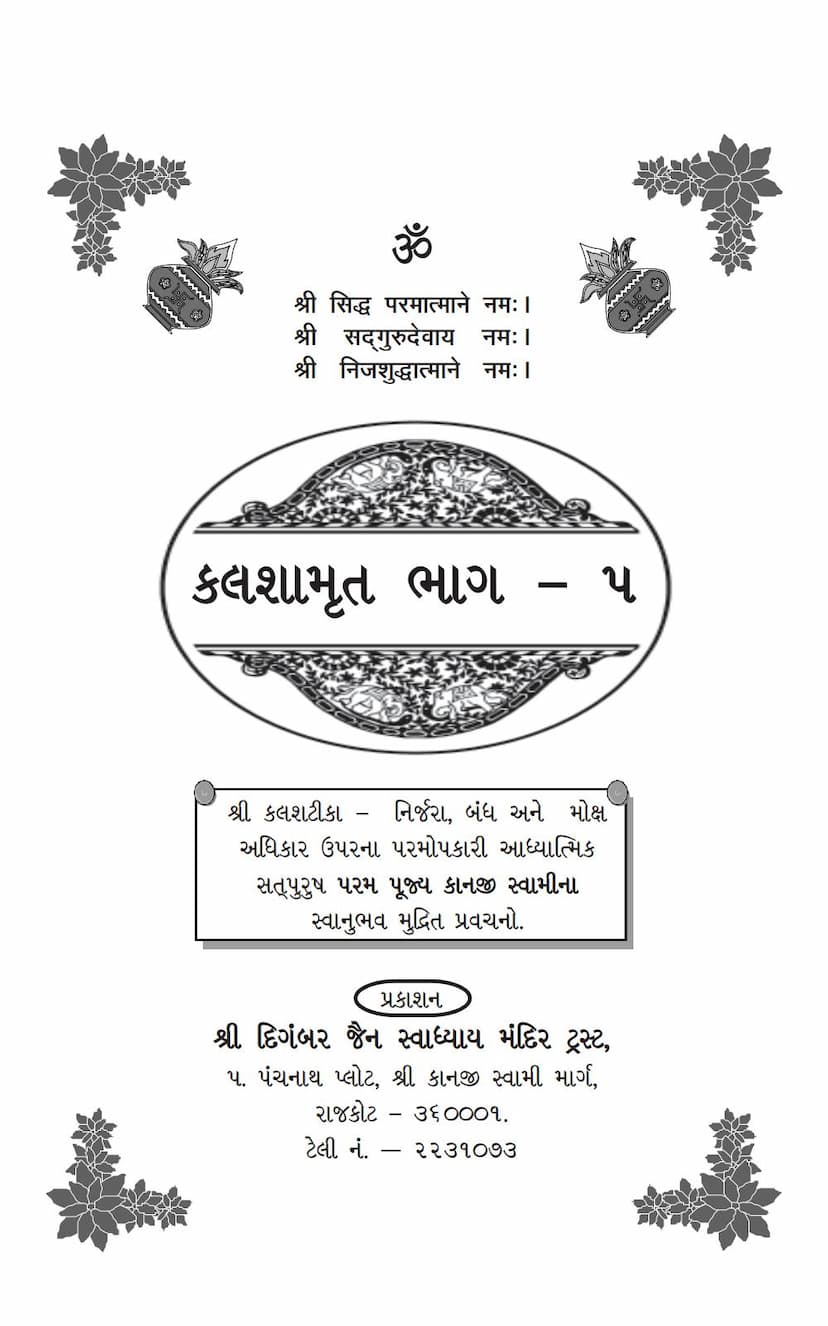Kalashamrut Part 5
Added to library: September 2, 2025

Summary
Certainly! Based on the provided text, here's a comprehensive summary of "Kalashamrut Part 5" by Kanjiswami:
Book Title: Kalashamrut Part 5 Author(s): Kanjiswami Publisher: Digambar Jain Swadhyay Mandir Trust, Rajkot, India Catalog Link: https://jainqq.org/explore/008260/1
Summary:
"Kalashamrut Part 5" is a collection of profound spiritual discourses by Param Pujya Kanji Swami, a highly realized soul deeply experienced in Jain philosophy. These discourses are based on the "Kalash" verses composed by Acharya Amritchandrasuri as commentaries on the revered "Samaysar" scripture, originally authored by Kundakundacharya.
This particular volume, Part 5, focuses on the principles of Nirjara (shedding of karmas), Bandha (bondage of karmas), and Moksha (liberation) within Jainism. The discourses delve into the deeper philosophical meanings and experiential aspects of these concepts, drawing from Kanji Swami's own profound spiritual insights.
Key Themes and Content:
- Commentary on Kalash Verses: The book contains Kanji Swami's interpretations and lectures on specific Kalash verses that elucidate the concepts of Nirjara, Bandha, and Moksha. These verses, composed as ornate additions to Amritchandrasuri's commentary on Samaysar, offer intricate spiritual nuances.
- Emphasis on Self-Experience: Kanji Swami's teachings are deeply rooted in his own spiritual realization. He guides the audience to understand these profound Jain principles not just intellectually, but through direct self-experience.
- Nature of the Soul: The discourses repeatedly emphasize the soul's inherent nature as pure consciousness, detached from karmic matter and the cycles of birth and death. The soul is described as eternal, blissful, and inherently free, though obscured by karmas.
- Understanding Karma and Liberation:
- Bandha (Bondage): The text clarifies that bondage is not caused by external actions or karma-pudgala (karmic matter) alone, but by the soul's own internal attachment, identification, and desire (raga-dwesha-moha) towards these external factors. The misconception of "I am the doer" and "I am experiencing the results" is highlighted as the root of bondage.
- Nirjara (Shedding of Karmas): True shedding of karmas occurs through righteous conduct (Samayik), spiritual contemplation, and the realization of the soul's true nature. It's not merely about performing rituals but about purifying the soul's consciousness.
- Moksha (Liberation): Liberation is presented as the ultimate goal, achieved by realizing and abiding in the soul's pure, unadulterated, blissful, and omniscient nature, which is entirely free from the influence of karmas and worldly fluctuations.
- The Role of Righteous View (Samyagdarshan): The discourses stress the paramount importance of Righteous View (Samyagdarshan) as the foundational step towards liberation. This involves understanding the soul's true nature, differentiating it from the non-soul (body, senses, mind, emotions, and karmas), and developing unwavering faith in its eternal, pure essence.
- Critique of External Rituals without Inner Realization: Kanji Swami often contrasts external religious practices (like rituals, penances, and austerities) performed without inner spiritual understanding and self-awareness with the true Jain path, which is centered on the soul's inherent nature. He emphasizes that true spiritual progress comes from internal purification and self-realization, not just outward actions.
- Anant Anubhuti (Infinite Bliss): The ultimate state of Moksha is described as an experience of infinite, unadulterated bliss and knowledge, stemming from the soul's self-realization and separation from all karmic impurities.
Overall Message:
"Kalashamrut Part 5" serves as a guide for sincere spiritual seekers (mumukshu) aiming for liberation. It encourages a deep introspection into the nature of the soul, the causes of bondage, and the path to freedom, all illuminated by the profound wisdom and experiential clarity of Acharya Kanji Swami. The text is a spiritual nectar, offering timeless insights for the journey towards the ultimate reality of the soul.
The book provides detailed explanations of complex philosophical concepts in a way that is accessible and inspiring, guiding the reader towards a deeper understanding and practice of Jainism.